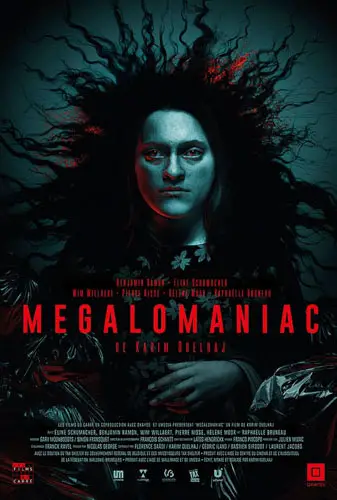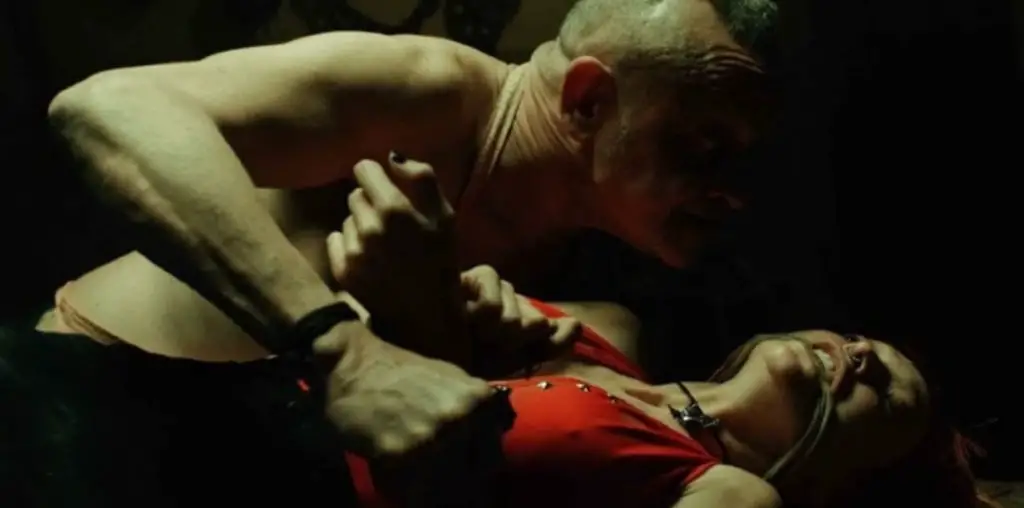
Between 1996 and 1997, a series of grisly murders occurred in Belgium. Body parts were found in bags strewn about the country, giving the killer the moniker The Butcher of Mons. Writer-director Karim Ouelhaj uses this as a jumping-off point to look at self-esteem, society, and passivity, all taken to the extreme in Megalomaniac. This isn’t a horror entry in the traditional sense, but it is an uncomfortable and frequently gruesome watch.
After a bloody birthing scene, Ouelhaj jumps to the present day. Felix (Benjamin Ramon) continues the work of his father, the Butcher of Mons, while also looking after his young sister, Martha (Eline Schumacher). She is so meek and timid that she never says more than a handful of words at her overnight job as a janitor. Hell, she doesn’t even have it in her to fight off Felix when he uses her however he wants.
After workplace bullies Luc (Pierre Nisse) and L’ouvrier (Quentin Lasbazeilles) rape Martha, her slim grip on reality loosens. The heinous act is witnessed by Jerome (Wim Wallert), who does nothing about it. This sends her and everyone in her orbit down a dark path from which there is no way out. Compounding all this are Martha’s visions of demonic beings trekking all over the siblings’ large estate. What’s really happening? Who, if anyone, is safe? Can Martha ever stand up for herself?

“…Martha’s visions of demonic beings trekking all over the siblings’ large estate.”
To fully understand Megalomaniac, one needs to understand what it’s truly about. Mind you, not what happens, a.k.a. the plot, but the gothic horror film’s themes and messages. At its core, the filmmaker is examining self-acceptance. Well, rather, how a total lack of it leads to diminished self-esteem, which hurts everyone around that person. Martha is a lesbian, but any woman she takes home becomes fodder for her brother’s awful pastime. She internalizes this, as well as the callous way Felix and other men screw her without consent, as that she’s somehow wrong or broken for liking women. Obviously, that’s not true, but the fallout from never fully finding out who she is or what she enjoys causes mayhem to befall people, even well-intentioned folks like Martha’s social worker.
The filmmaker rawly presents the events, meaning every action looks and feels disgusting. The production design, specifically of Martha’s home, is just as dilapidated and broken on the outside as she is on the inside. It’s an excellent way to visualize the themes without making them so blunt audience will feel assaulted by a jackhammer. Also of note is the score by Simon Fransquet and Gary Moonboots. It is eerie and dramatically adds to the unsettling atmosphere there permeates every second of the nearly 2-hour runtime.
All the actors do a good job, but Schumacher, unsurprisingly, is the stand-out. She performs the internalized hatred of Martha with ease. The character instantly gains the audience’s sympathy, and that is in large part due to how the actor plays her. Yes, how docile she can be is frustrating, but Schumacher never loses viewers, keeping them glued as all-watching hope the lead can finally accept herself and get what she ultimately desires and deserves.
Megalomaniac is ugly to watch but in a beautiful way. Said ugliness stems from the actions and deeds most of the characters do. But Ouelhaj captures the great unwashed of Belgium in a style that is captivating. Schumacher owns her role in a way that is both empathetic and frustrating. While this is an unnerving, uncomfortable watch, it is also profound.

"…ugly to watch but in a beautiful way."



[…] Source link […]